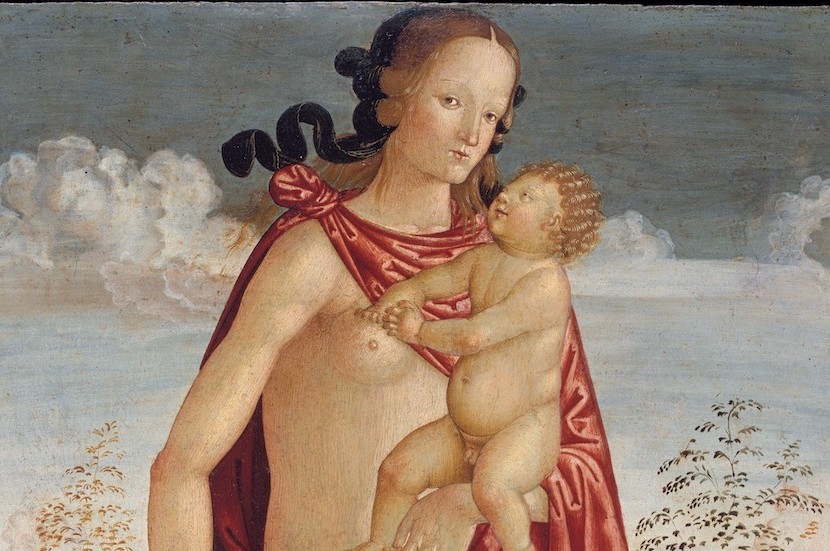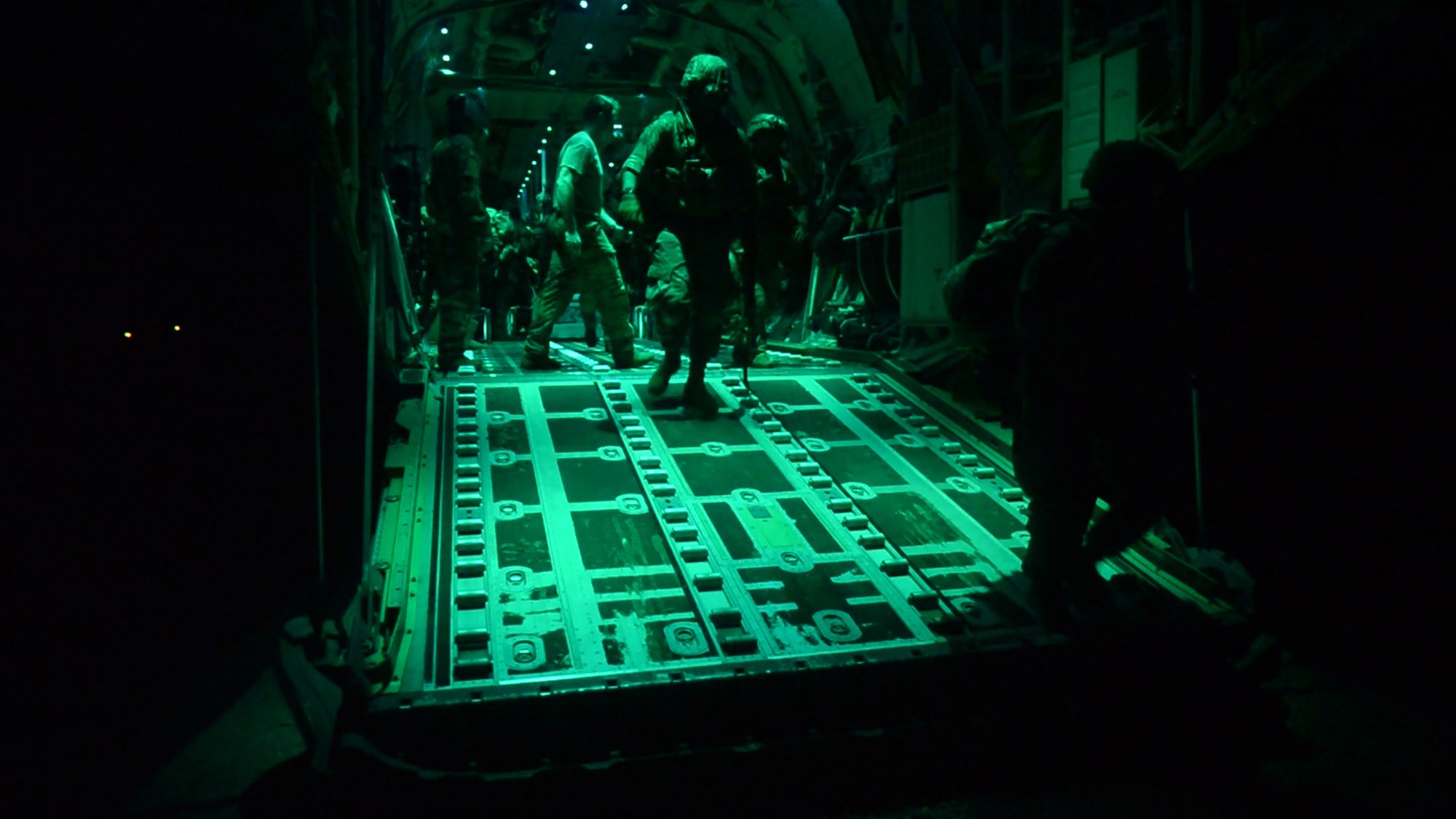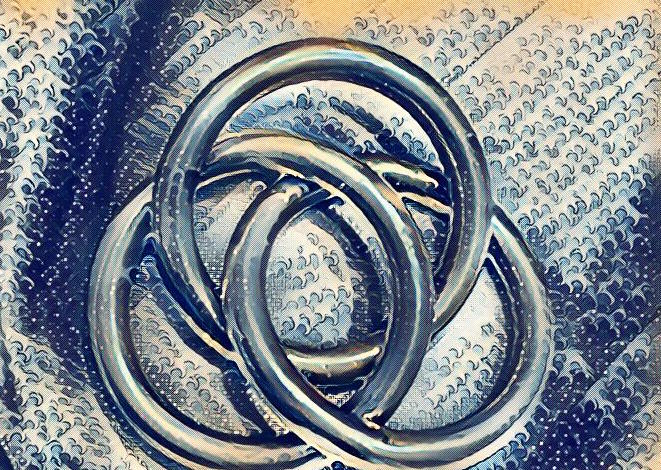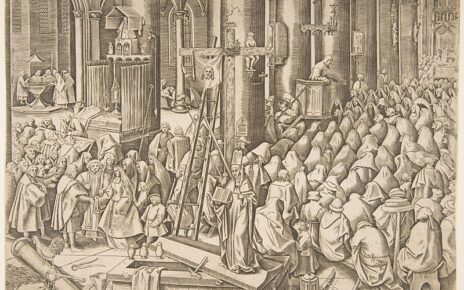The following is the first of a two-part series.
“God is the ‘beyond’ in the midst of our life.”
– Dietrich Bonhoeffer[1]
“Are you lost, Father?”
“Sorry?”
“Are you lost?”
“No. I suppose not.”
– Darlene Sweet and Father Flynn speaking the first lines of Bad Times at the El Royale
Classically, philosophers spoke of Courage, Temperance, Prudence, and Justice as four key or cardinal virtues; following particularly from Christian scripture, theologians later added to this list the three theological virtues of Faith, Hope, and Love. According to Thomas Aquinas, what distinguishes the former four from the latter three is the nature of their object: teleologically, the cardinal virtues aim at the natural excellence of humans qua humans, whereas the theological virtues specifically direct us beyond ourselves to focus on the Divine; as Thomas says, “the object of the theological virtues is God Himself, Who is the last end of all, as surpassing the knowledge of our reason. On the other hand, the object of the intellectual and moral virtues is something comprehensible to human reason.”[2]
Seven centuries later, Jacques Derrida famously commented that the “constancy of God” throughout his life was often “called by other names” so that he could “quite rightly pass as an atheist” despite conceptualizing something he considered ultimately meaningful — even quasi-divine.[3] Throughout his book The Prayers and Tears of Jacques Derrida, John Caputo meditates upon what Derrida could have meant by this by exploring the religiosity infused throughout the Derridean corpus, finally framing his conclusion as a confession: the “sentence I have all along been trying to write,” says Caputo, in its most impassioned form reads as so: “I do not know what I love when I love my God.”[4]
If Thomas is right, then the absence of theistic commitment precludes the cultivation of genuine faith, hope, and love — any attitudes bearing such names, without God as their genuine object, are simply pleasant feelings devoid of further significance. Against this, Caputo insists that Derrida’s faith is real, saying:
When something unforeseeable and unknowable, unpossessable and impossible drives us mad, when the tout autre becomes the goal without goal, the object without object, of a dream and a desire that renounces its own momentum of appropriation, when the impossible is the object of our love and passion, is that not what we mean by “my God”? Is that not the name of God? Is that not a name that we would bend every effort to save, with or without religion?[5]
For Caputo, the entirety of his deconstructive project has been motivated to unveil this religion-less God — this “restless passion” for something greater than oneself that, whether or not it is divine or even supernatural, offers the chance of a properly religious response. It grants the faithful person a standpoint from which the visible horizon of their lives has meaning, regardless of whether or not some deity might be found beyond that horizon.
This, I will argue, is the God we see in the cinematic work of Drew Goddard: not the deity of Thomistic theism, but a God of Derridean passion for something that transcends ourselves. God might well be dead to Goddard, but religionless religion can still function to undergird a meaningful life for those left behind after God’s wake. By focusing particularly on Goddard’s 2018 thriller Bad Times at the El Royale,[6] I aim to illustrate Caputo’s confession by demonstrating how, even after the death of God, the theological virtues of Faith, Hope, and Love still remain.
Religionless Religion in Bad Times at the El Royale
On its face, Bad Times is not a theological film, but a thriller about the chance meeting of seven (mostly) strangers at an unusual hotel on a stormy night. Nevertheless, it repeatedly evokes religious themes and is suffused with the concern for self-transcendence that Dietrich Bonhoeffer described as a “religionless” approach to piety. God makes no overt appearance in the narrative, but, following Bonhoeffer in perceiving the Divine’s proper place being “not on the borders of life, but at its center,” we can recognize in Bad Times the same “insistence” of existential meaning that unavoidably persists throughout human experience.[7] As Caputo explains:
My entire idea is to reclaim religion as an event of this world, to reclaim religion for the world and the world for religion. I have not annulled the religious character of our life but identified its content and extended its reach, by treating it as a name for the event by which life is nourished. In so doing we have redescribed and marked off religion within the boundaries of the world.[8]
In this way, Bad Times can offer a window into what post-religious theological virtues might look like, even in a world without God.
Initially, the audience is introduced to most of the characters in the hotel lobby, split along the state boundary between Nevada and California, but first impressions are quickly revealed to be untrustworthy when the privacy of his own room reveals Laramie Seymore Sullivan, the brash and off-putting vacuum cleaner salesman, to actually be Agent Dwight Broadbeck, a sensitive father working for the FBI. In speaking with his daughter on the telephone, Broadbeck’s alteration of a common bedtime prayer establishes the theological premise of the film: God’s not here, so we must care for each other.
Typically, the familiar nighttime blessing runs as follows:
“Now I lay me down to sleep / I pray the Lord my soul to keep /
If I should die before I wake / I pray the Lord my soul to take.”
According to Broadbeck‘s daughter, his wife has determined the final couplet to be “morbid” and therefore replaced it with the lines:
“And when I wake in the morning light / teach me to do what’s right.”
Although Broadbeck’s later attempt to “do what’s right” ultimately prevents him from seeing the light of the next morning, this benediction — and its explicit replacement of divine activity with imperfect human agency borne from relational ties — underlies each of the virtuous actions demonstrated in the remainder of the story. The fact that such virtue remains untethered from God does not diminish its virtuousness.
Broadbeck’s conversation with his daughter is not the only prayer in the film; in different ways, Father Flynn, Darlene Sweet, Emily Summerspring, and (especially) Miles Miller each appeal to a higher power at different points, and — with one possible exception — no answer comes to any of them from On High. Instead, the psychopathic Billy Lee appears and takes control of the El Royale, manifesting a downright Nietzschean position of strength within a world devoid of God. In a flashback scene at a bonfire, after waxing poetic about moving beyond Right and Wrong, establishing himself as the leader of the cult-like “family,” and setting up Emily’s sister, Rose, to fight for her life, Lee makes the assertion that, in his view, “we get to be our own Gods.” Although Billy is struck down before the credits roll — at the hands of the genuinely pious Miles, no less — at almost no point does Goddard suggest that Billy Lee’s sermon is actually incorrect. No clear deus ex machina appears to rescue the innocent; no Hand of God smites the wicked with Divine Judgment, no surprise twist leads to a completely happy ending for “the good guys” — in the end, there is no one innocent, no one perfectly good, just a jazz singer helping a felon dressed as a priest flee into the rain with a bag full of stolen money.
Indeed, rather than setting out stark categories of ‘heroes’ and ‘villains,’ the film constantly complicates introduced dualities, showing how weak characters like Sullivan and Miles are actually heroic, how innocent players like Rose are, in truth, murderous, how the security of each hotel room is undermined by the hidden passageways behind the walls, and how the seemingly religious figure of Father Flynn is actually a criminal named Dock O’Kelly. Over the course of the film, the two people most clearly trying to do the right thing — Broadback and Emily — receive only their own deaths as payment. In a post-religious world, unmoored from the sort of moral grounding that folks like Aquinas took to be necessary for firm ethical positioning, it might be unclear what constitutes goodness and its opposite. The very geography of the El Royale satirizes the unfounded dogmatic commitments to which the faithful might still cling — after all, only one side of the hotel can sell alcohol — but even this duality burns to the ground by the movie’s end.
But regardless of what morality amounts to in the world of Bad Times, whether or not God exists to underwrite it, and even if those with good intentions are routinely defeated by supermen like Billy Lee, the story is drenched with the sort of spiritual content that grounds a post-religious understanding of Faith, Hope, and Love. Though after the death of God, theological virtues cannot take God as their object, Faith, Hope, and Love can nevertheless guide us in positive ways even if those virtues are directed towards other people instead of a divine person; as Caputo says, “If the name of God is a how, not a what, then the name of God is effective even when it is not used.”[9]
So, post-religious theological virtues can remain differentiated from the cardinal virtues by way of their direction-of-fit (with the cardinal virtues directed inwardly and the theological virtues directed outwardly), but, contra Aquinas, the receiving targets of the external virtues do not ultimately need to be divine, provided that there are humans qua humans there to stand in God’s place.
Faith
Consider first the virtue of Faith. To Aquinas, an act of faith is to believe in God where belief is “to assent to someone of one’s own free will”[10] in a manner that, by definition, cannot be directed towards something false.[11] Consequently, faith is a function of an agent’s intellect when that person is able to apprehend God and admit that God is God. As Eleonore Stump explains, to Thomas, faith entails forming “an assent to a group of propositions under the influence of a volition which has the effect of moving the intellect to an assent it otherwise would not have formed.”[12] This sort of chain-of-reasoning that faith constitutes — what Dan Howard-Snyder has called “objectual faith” or “faith-in-x”[13] — amounts to something relatively simple; as Swinburne puts it, “to have faith in God is simply to have a belief-that, to believe that God exists.”[14] Understandably, Aquinas is more specific about necessary contextual factors for faith qua faith to stand (for example: it is interdependent on the third theological virtue of love for God), but these comments should be sufficient to grasp the core element of Thomistic faith as a cognitive enterprise grounded in right judgment of God’s identity.
In contrast, the characters in Bad Times do not come to recognize God for who God is, but rather they come to see each other for who they truly are. To different degrees, all seven characters begin their arcs behind a mask; by the end, the only ones to survive have been forthcoming in their revelation of their true identities. The most extreme masks are the alter-egos adopted by Broadbeck (Sullivan) and O’Kelly (Flynn), who go so far as to take on new names, professions, and histories to complete their charade. While Emily’s profane signature in the hotel guest book might be loosely read as a humorous example of this, her mask is one of explicit ambiguity insofar as her desire to keep her brainwashed sister safe leads her to hide her true intentions and identity. Miles’ mask is similar to this, though not of his own wishes: despite his persistent requests to confess his sins to “Father Flynn” and reveal the history of violence behind his mild-mannered hotel clerk mask, it is not until the fiery baptism of the final conflict (by which point, the buckshot wound on his face has given him a different sort of mask) that the other characters learn his truth. Appropriately, Rose and Billy Lee’s masks come as a pair: she appears to be an innocent child, he seems to be an attractive charmer, but both turn out to be cruel sadists by the end (and, particularly for Billy Lee, those masks are marred by the violence of the final fight). And though Darlene Sweet is certainly the most honest character of the bunch, even she reveals herself to be wearing a wig at the start, removing it only after making her pact with O’Kelly and attempting to cover the sound of his crowbar with her song.
A.G. Holdier is a doctoral student in philosophy and public policy at the University of Arkansas.
______________________________________________________________________________
[1] Dietrich Bonhoeffer, Prisoner for God: Letters and Papers from Prison, ed. Eberhard Bethge, trans. Reginald Fuller (New York: The Macmillan Company, 1959), 124.
[2] Thomas Aquinas, Summa Theologica, 2nd ed, trans. the Fathers of the English Dominican Province, available online at http://www.newadvent.org/summa/index.html; I-II, Q62, A2.
[3] Jacques Derrida, Circumfession, trans. Geoffrey Bennington (Chicago: University of Chicago Press, 1993), 155.
[4] John Caputo, The Prayers and Tears of Jacques Derrida: Religion without Religion (Bloomington: Indiana University Press, 1997), 332.
[5] Caputo, Prayers and Tears, 332.
[6] Bad Times at the El Royale, dir. Drew Goddard (20th Century Fox), 2018.
[7] Bonhoeffer, Prisoner for God, 124.
[8] John Caputo, The Insistence of God: A Theology of Perhaps (Bloomington: Indiana University Press, 2013), 247.
[9] John Caputo, On Religion (New York: Routledge, 2001), 138.
[10] Summa Theologica, I-II, Q65, A4.
[11] Summa Theologica, II-II, Q4, A5.
[12] Eleonore Stump, Aquinas (New York: Routledge, 2003), 361.
[13] Daniel Howard-Snyder, “Does Faith Entail Belief?,” Faith and Philosophy 33, no. 2 (2016): 143, doi: 10.5840/faithphil201633059.
[14] Richard Swinburne, Faith and Reason, 2nd ed. (Oxford: Clarendon Press, 2005), 138.




